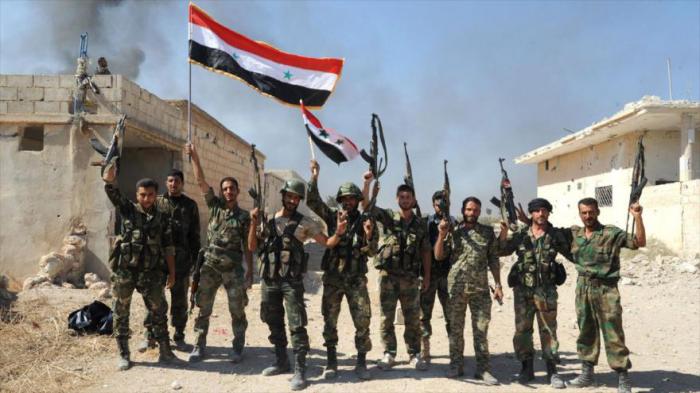
Pretexts and Lies Against Syria
March marks the ninth anniversary of the aggression unleashed against this Middle Eastern country, which has been torn apart by many foreign interests
By Elson Concepción Pérez
February 17, 2020
Translated and edited by Walter Lippmann for CubaNews.

People’s forces and the Syrian army celebrate their victory in Hama province. Photo: Hispan TV
Let us put things in place: Syria is an independent and sovereign country, with a democratically elected government, whose program has been directed towards development and social benefits for its people.
It is also part of its status as a sovereign nation that it has the right to sign military agreements with anyone it deems fit. In this case, it is entirely legitimate that it has requested military collaboration from Russia and Iran to defend the country against the terrorism of internal groups and against foreign actions aimed at destabilising the Arab nation.
It has had difficulties and, as in all countries with diverse religious currents, many have been and still are the setbacks in harmonizing its walk in the midst of a region besieged by a foreign power interested in its energy resources.
In this context, it is worth noting that the government of President Bashar al-Assad has made significant economic and social progress in favor of the most dispossessed sectors.
But Syria has become a stumbling block for US policy in the Middle East region and the imperial drive to seize its resources, just as it has done with Iraq and Libya.
A terrorist group called the Islamic State (IS), which many specialists consider to have emerged from the subversion laboratories conceived by the U.S. CIA. IS [ISIS] appeared in the region a little over a decade ago and soon expanded like a bad weed, with a matrix of the most ruthless terrorism.
Together with the EI, a group openly supported by the United States, the Al Nusra Front, a descendant of the shadowy Al Qaeda, established itself on Syrian soil, putting in check its defense system. Moreover, it has suffered and continues to suffer for years from the direct aggression of Israel which has occupied part of the Syrian Golan Heights.
This March marks the ninth anniversary of the war of aggression unleashed against the country. Alarming figures, such as the more than 250,000 dead and more than that number of wounded, as well as the forced displacement and migration of millions of its children fleeing the war and the total or partial destruction of cities, industries, world heritage temples and many other facilities, constitute open wounds that are very difficult to heal.
THE DANGER IS SPREADING
Since last year, the Syrian People’s Army, with the active participation of the Russian aerospace force and Iranian advisers, had defeated terrorist groups in almost 90% of the territory, while the government was demanding the withdrawal of the American military that illegally occupied a part of the country under the assumption of fighting terrorism.
The bombing of areas where the Syrian army was operating, the death of many of its combatants and, in addition, the massacre of hundreds of civilians, including children, with the usual “collateral damage” caused by its bombs, have been part of this reality.
Already almost defeated by the action of the terrorists, those of the Al Nusra Front, supported by Washington, were concentrated in areas near the Turkish border, in the region of Idlib, where there is also the presence of Kurdish groups.
In recent days, on February 12, U.S. military forces opened fire on local residents who gathered near a Syrian Army checkpoint east of the town of Qamishli (Hasaka, Syria) to block the passage of several U.S. military vehicles.
As for the presence of uniformed Turkish soldiers on Syrian soil, the Government of Damascus has characterized it as “a violation of the sovereignty of its territory”.
In recent days, more than a thousand military transports and 5000 Turkish soldiers have crossed the border. Syrian sources accuse the Turkish artillery of having supported the armed terrorist groups’ fighting in Idlib.
As we can see, the current war imposed on Syria may reach a new dimension where, in addition to the internal actors, other external ones are involved, including Turkey in the Idlib border area.
It is quite possible that Trump, in this case, is playing at involving others in a war he has lost, so that he can enjoy his longed-for oil without having to subject his forces to the danger of confrontation.
Not for nothing did the U.S. president, in an interview with Fox News, emphasize once again his administration’s policy of “taking” Syria’s oil.

You must be logged in to post a comment.